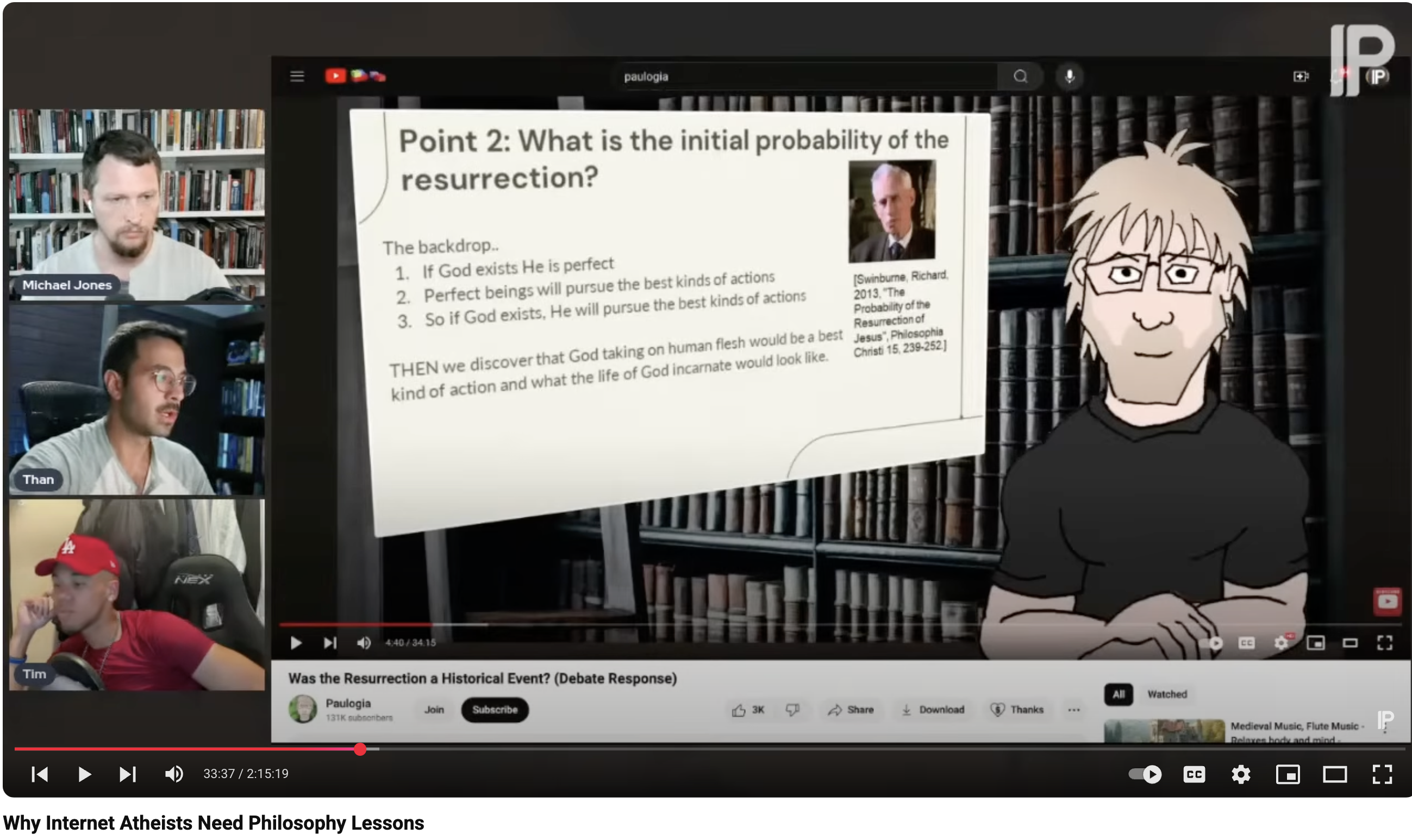
Gravitational Attraction
What would happen if two people out in space a few meters apart, abandoned by their spacecraft, decided to wait until gravity pulled them together? My initial thought was that …
In #religion

I just listened to the Debate Between Than Christopoulos and Matt Dillahunty about the question "Did Jesus Rise from the Dead" and the response by Paulogia and the reponse to the response from Than and others.
I'm taking some independent pieces of these videos to respond to, but I encourage you to look at the entire set to make sure I am not taking things out of context.

Paulogia looks at this slide and sees Swinburne, and by extension Than and the others, reading Christian intuitions into their argument for the properties of God. I agree entirely -- once you have a Christian mindset, the motivations of God seem obvious, e.g. incarnation is one of the best kinds of actions. If you didn't have the Christian mindset, then entirely different properties of God would be obvious.
Paulogia says:
30:57 even if you could first move me to a theistic conceit of a Creator being or beings no other god-based religion through history thought God would want to raise a being from the dead hundreds of thousands of years of humanity having entirely different intuitions about what God would or would not do according to the Gospels even the disciples didn't think this ahead of time everyone who's come to this conclusion has done so post hoc rationalization looking backwards
Than accuses Paulogia of not knowing basic epistemology, and quotes a passage from Swinburne about what he is doing,
Swinburne:
33:03 it needs the Christian tradition to make us aware of the particular theory of the divine nature and of what a Being with that nature might be expected to do [...] before we can judge whether or not by objective standards the evidence supports that theory. Most physicist could never have invented the general theory of relativity for themselves but once it was proposed for discussion they can assess whether in fact the evidence supports it.
Than summarizes with,
33:37 so long story short is like in that quote Swinburne argues that the Christian tradition provides a framework for understanding and evaluating certain theological conceptions particularly in this instance the Incarnation and he suggests that the Christian tradition as articulated by those guys offers a specific theory of the divine nature in the actions we might expect from that divine nature and so then he compares that to how physicists will come up with hypothesis and then later on figure out what the probability of the hypothesis is true given the data in other words what Paul's complaining about is the same exact thing that happens in science.
The parallel with science is misguided in a couple of specific ways. First, when General Relativity was proposed it was able to be consistent with all of Newton's Laws and further was able to explain details of the orbit of Mercury that were known to be inconsistent with Newton's Laws. What does Swinburne's framework actually explain that was unknown before? Second, and more importantly, a key prediction of General Relativity was that starlight would bend around gravitational bodies but it took some years to confirm that prediction (and many more predictions). What predictions does Swinburne's framework make? It is easy to create a framework post-hoc to explain anything, but the proof is in the prediction. One might argue that philosophy doesn't make predictions, but I think if we are making inferences about an agent that is supposed to exist now and acts in the world now, then I am fully justified to reject any "explanation" that doesn't come with predictions.
Than continues,
34:07 I'm not just going "hey my intuitions tell me this about what God would and wouldn't do", I'm saying if we have this conjunction of God's existence and some sort of Value Theory the two together tell us what God would or wouldn't do
What he doesn't seem to realize is that the way that he is choosing and interpreting his Value Theory and its consequences is driven seemingly entirely from his already preconceived Christian ideas. These are the intuitions Paulogia is pointing out, and it doesn't help for Than to try to back it out one step and say that it is God+Value Theory and not just God where the intuitions are coming from. Paulogia is just cutting out the middle man. Than may not believe that this is what he is doing, so the only way I see to settle that matter is for Than to actually make testable predictions of his Theory/framework. Since he claims he's doing just what they do in science, this is exactly how arguments of perceived bias in researchers are settled in science -- make the predictions and do the experiments.